Remembrance, Religion and Secularity in Central and Eastern Europe and Beyond Conference
Zakończyła się konferencja "Remembrance, Religion and Secularity in Central and Eastern Europe and Beyond Conference" (13-15.06.2024). W konferencji udział wzięło ponad 50 osób z kilkunastu krajów, od Indii po USA. Szczególnie cieszyła obecność przedstawicieli krajów regionu wyszehradzkiego – Czech, Słowacji, Węgier i Polski, co świadczy o tym, że nasz regionalny dialog jest realny i rezonuje z badaniami na zachodzie. Dziękujemy za świetne referaty i żywe dyskusje! Gratulujemy świetniej organizacji dr Zuzannie Bogumił, która była liderką wydarzenia!

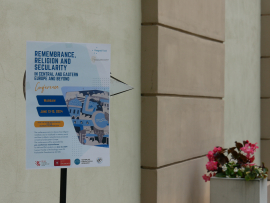
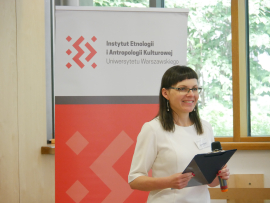
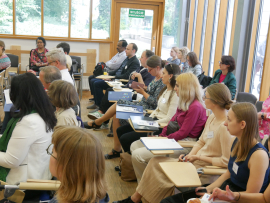
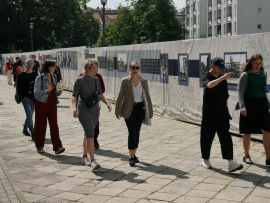
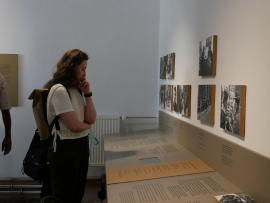
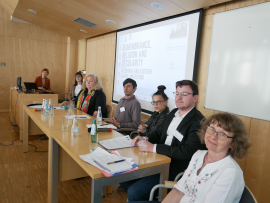
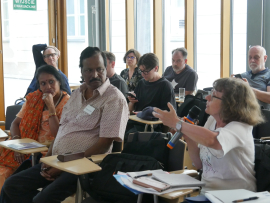
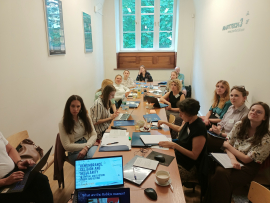
Konferencja była organizowana przez Instytut Etnologii i Antropologii Kulturowej oraz Centrum Badań Figuracyjnych Wydziału Socjologii Uniwersytetu Warszawskiego oraz Instytut Archeologii i Etnologii Polskiej Akademii Nauk. Wydarzenie jest finansowane w ramach międzynarodowego grantu Post-secular approach to memory processes in Central-Eastern Europe finansowanego przez Visegrad Fund ID 22230096 oraz programu „Inicjatywa Doskonałości – Uczelnia Badawcza” Uniwersytetu Warszawskiego. Partnerami konferencji byli Centrum Badań na Pamięcią Społeczną (Uniwersytet Warszawski), Working Goup on Lived Religion (Penn State University) oraz the KFG “Universalism and Particularism in European Contemporary History” (LMU Munich).
About the conference:
This conference aims to discuss how religion mobilizes and is mobilized in memory work, and how it affects remembrance processes in Central and Eastern Europe and beyond. Even a cursory look at the European ‘memorylands’ shows clearly that the tension between religion and the secular is part of a number of heterogeneous and contradictory memory projects. However, while both memory and religion in post-socialist Europe have been intensively researched, the relationships between memory, religion, and secularity deserve deeper consideration, particularly in light of the movement of the secular into the religious and vice versa; these entanglements, mutations, appropriations and translations are visible not only in the region but also beyond it.
The starting points for this conference are five general assumptions. First, secularism and religion vary in different societies and therefore require sensitive analysis that pays attention to specific historical and contemporary configurations of the societies in question. Second, the experience of forced secularization under communism, and subsequent religious revival, has resulted in religion taking an active part in the public sphere of this region, including remembrance processes. Third, post-conflict societies are prone to work through the past and thus look for various explanatory narratives, some of which are religious. Fourth, most of the post-secular theoretical concepts have been developed in the West to describe Western societies. Their applicability to post-socialist societies, therefore, requires a reconceptualization tailored to the unique cultural and historical context of this region. Finally, in addition to subordination to the Soviet Union during the communist period, the region has experienced other colonialisms, all of which have had a significant impact on its religions, secularities and memory processes. Decolonial studies, subaltern studies, and particularly postcolonial post-secular studies, which pay attention to the role of religion in decolonial processes, seem promising when combined with and as a challenge to post-socialist studies. During the conference we plan to discusses what all of these factors mean for remembrance processes and cultures of memory in Central and Eastern Europe.
The conference has evolved from the project “Post-secular approach to memory processes in CentralEastern Europe” https://iaepan.edu.pl/post-secular-approach-to-memory-proces...', hosted by the Institute of Archaeology and Ethnology, Polish Academy of Sciences, and supported by International Visegrad Fund (ID 22230096, 2023-2024).
Special events
- Plenary sessions: Memory and Post-secularism – Jose Casanova (Georgetown University, USA), Manav Ratti (Salisbury University, USA) and Stanislav Obirek (The American Studies Center, UW)
- Plenary session: Memory and Religion in Central and Eastern Europe - Tatiana Zachar Podolinská (Institute of Ethnology and Social Anthropology, SAS), Małgorzata Głowacka-Grajper (Faculty of Sociology, Warsaw University), Csaba Szaló (Masaryk University), Andreas Máté Toth (University of Szeged), Liliya Berezhnaya (Central European University).
Pre-conference Master Classes (June 12, 2024)
This one-day intensive masterclass is designed for MA and PhD students from the Visegrad region to discuss their ongoing work on remembrance, memory and religion in Central and Eastern Europe. Students will present their research to their peers and instructors and gain detailed feedback from experts in the field on their work. Attendees of the masterclass also participate in the conference and all special events.
Detailed program (PDF)
Conference organization information
Language: English
Conference Convenors
- Zuzanna Bogumił, PhD. (Institute of Ethnology and Cultural Anthropology, UW/ Institute of Archaeology and Ethnology, PAS)
- Marta Bucholc, Prof. (Faculty of Sociology, Warsaw University)
Academic Council of the conference
- Kamila Baraniecka-Olszewska, Prof. (Institute of Archaeology and Ethnology, PAS)
- Agáta Šústová Drelová, PhD (Institute of History, SAS)
- Agnieszka Halemba, Prof. (Institute of Archaeology and Ethnology, PAS)
- Andriy Fert, PhD (the National University of Kyiv-Mohyla Academy)
- István Povedák, PhD (Institute for Theoretical Studies, MOME)
- Barbora Spalová, PhD (Institute of Sociology, Charles University)
- Nikolai Vukov, PhD (Institute of Ethnology and Folklore, BAS)



